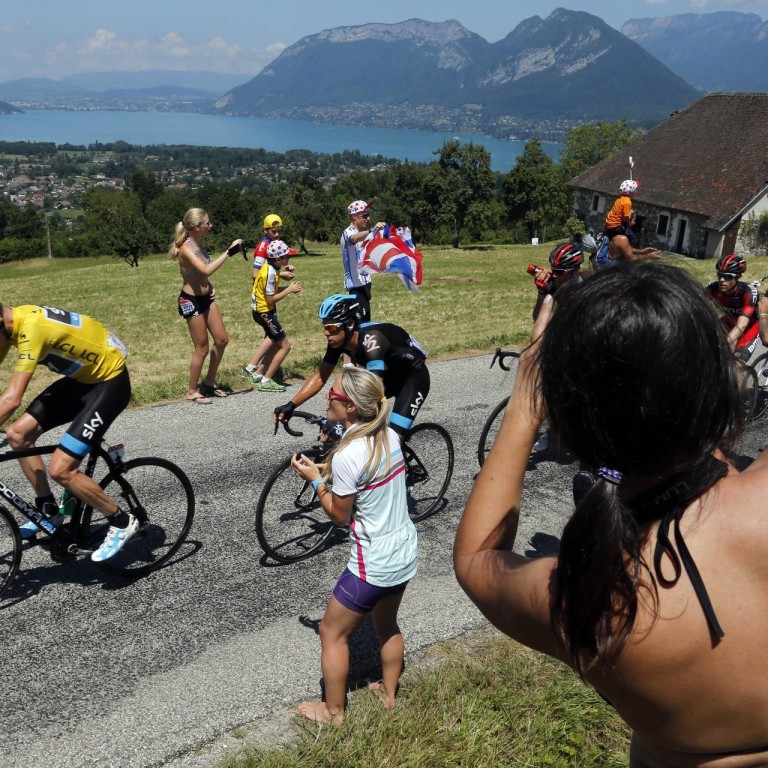
Chris Froome's battle to the top in cycling world
After second place last year, fighting parasitic illness and battling doping suspicions, Briton reveals the moment he knew his dream had come true
As he was fighting gravity in the final climb of the Tour de France, Chris Froome allowed himself to realise he had his maiden grand Tour title virtually sewn up.

Froome, 28, described the way he felt as stage winner Nairo Quintana was pulling away in the final miles of the stage and his own legs were going rubbery. He was overtaken by a sense of elation, and relief, that victory would at last be his.
"I've actually done this. I'm in yellow, this is the last day of GC and nobody is going to take it away from me," he recalled, referring to the general classification, the group of contenders for the overall victory. "It was a very emotional feeling."
Froome was born and raised in Kenya, learning to ride in the hills around Nairobi, then racing while attending school in South Africa. After performing well in African races, he quit college to accept an offer to ride with a small team in Europe.
The next year, 2008, he turned professional and he rode his first Tour de France in 2009.
His ascent was slowed in part by a battle with bilharzia, a parasitic infection he contracted during a trip to Africa.
The parasite remains in his system, causing abdominal pain and diarrhoea when it flares and requiring him to take medication periodically.
Froome said that he was not taking the medicine during this Tour. A second-place finish in the 2011 Vuelta a Espana confirmed - to the cycling world and to himself - that he was a contender.
"That gave me a lot of confidence and belief in myself that actually I do belong in this group of riders at the front," Froome said. He also finished second in last year's Tour, behind his teammate Bradley Wiggins.
A British citizen, Froome spoke warmly of Africa on Saturday, saying he hoped his performance would inspire young African riders and describing the happiness he felt when customs agents in Kenya recognised him.
Tall and gangly, Froome is not a thing of beauty on the bike. His long arms flap and his face frequently contorts with effort.
Yet he has proved to be more durable and usually more powerful, than his more stony-faced rivals. "He isn't a stylish and smooth rider like other Tour winners," said Jonathan Vaughters, chief executive of Slipstream Sports, which owns the Garmin-Sharp team.
"But that's sort of the same with the Kenyan marathoners. They don't always look efficient, but they are."
Video: Tour de France fans celebrate Chris Froome's victory
If Froome has a vulnerability, other riders say, it is in his bike handling on descents. He nearly crashed into Contador during a descent on stage 16. But on a downhill section between dual ascents of Alpe d'Huez on stage 18, his team kept him safe near the front of the peloton.
Because the Tour is so arduous and long - 3,404 kilometres over 21 stages - holding the leader's yellow jersey into Paris requires not just winning stages, but doing well enough everywhere else.
His dominance of this race caused some anti-doping watchdogs to raise the possibility that he might be using performance-enhancing substances. Froome has repeatedly denied the suggestion, but the questions persisted throughout the Tour.
In an attempt to quiet those questions, Sky released drug test results and power output measurements from several of Froome's races in recent years to a French sports newspaper and a sports scientist. They concluded that Froome's performances were possible for an athlete who was not doping.
Froome has handled those questions with the same demeanour he has shown on the road. Soft-spoken and thoughtful, he is not one to show the bravado of a Lance Armstrong or the bluntness of a Wiggins.
On Saturday, Froome said he considered it "completely understandable" that people question whoever is wearing the yellow jersey. "I'm also one of those guys who's been let down by the sport," he said.
"I just hope that by winning this year's Tour, I'll be able to change that. I know it will take a lot more time."
Barring injury or illness, Froome will probably return next year as the favourite, and he made clear that he believed he had many good years to go.
"Each year I've taken so much away and learned so much," he said. "I refuse to accept I don't have improvements to make."
But Quintana, for one, will have something to say about that. "If we look at what happened today, it's true I am full of hope," he said. "Maybe in 2015, we will try to win the Tour de France."
